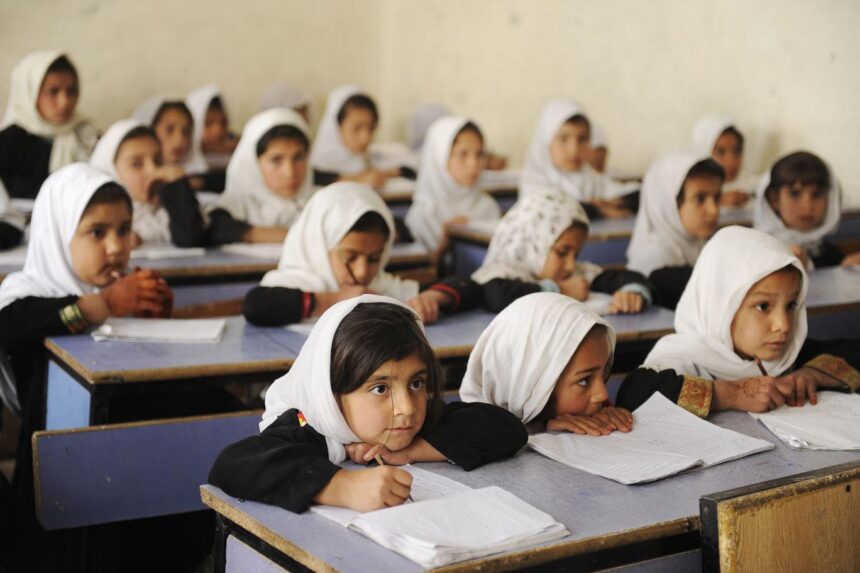RASC News Agency: The education and upbringing system in Afghanistan face numerous challenges, encompassing curriculum, teaching methods, lack of expertise, mechanical impracticality, and other aspects. The prolonged years of conflict have greatly damaged the education system, rendering it stagnant and inefficient. This system harbors many deficiencies and fails to meet the people’s needs, persisting with unresolved issues for centuries. Therefore, addressing the problems and improving societal conditions necessitates a more pragmatic educational system, examining its shortcomings from various perspectives to reach conclusive solutions.
Educational Curriculum
One of the challenges that the education system grapples with is the educational curriculum. Afghanistan’s educational curriculum has become antiquated and decayed, lacking innovation over the years. It has lost its effectiveness and can no longer address contemporary challenges. Universities, schools, and other educational institutions in Afghanistan teach from textbooks several years old, devoid of contemporary solutions to modern societal problems. They teach largely theoretical and outdated concepts, lacking relevance to the present era and substantial scientific theories.
Teaching Methods
Another issue revolves around teaching methods. Unfortunately, modern teaching methods are unheard of in Afghanistan. Neither teachers nor students are familiar with modern methodologies; instead, they resort to outdated approaches. Moreover, teachers tend to be overly harsh with students, leading to their disinterest in learning. In essence, the teacher-student interaction is harsh, devoid of modern teaching tools, ultimately rendering this teacher-centric and compliant student approach ineffective in terms of modern educational methods.
Lack of Specialization in Subjects
Another notable challenge is the lack of specialization in subjects. Firstly, there is a scarcity of professional and specialized instructors in many fields, and even if they exist, they are scarce and insufficiently equipped to handle the curriculum. Secondly, most subjects lack specialization, with numerous unrelated subjects taught in each domain, resulting in convoluted curricula. These issues have worsened with the addition of various cultures to different educational institutions, exacerbating the problem. Learning about divorce, repudiation, declaration, and other matters for doctors and engineers yields no benefit, except wasting their time and diverting the focus from professional subjects to non-specialized ones.
Mechanical and Impractical Lessons
Another serious challenge is the mechanical and impractical nature of lessons. In Afghanistan, most lessons are memorized for exams, with little emphasis on practical application. Unfortunately, this practice is ingrained in people’s minds and not easily eradicated. When Eastern and Western students performed practical tests, it became evident that Eastern students were far more successful in mechanics than Westerners. However, when it came to practical application, Eastern students failed to find solutions. This problem has created significant gaps in the educational system. The lack of resources and proper facilities in schools, universities, and even other educational institutions is alarming. Moreover, the excessive repetition of this practice has tinted mechanics in students’ minds. Additionally, teachers pay less attention to this matter. Most importantly, weaknesses persist in educational institutions, including families, kindergartens, schools, universities, and cultural, civil, and social institutions. While families play a fundamental role in educating and nurturing children, in Afghanistan, they have played a lesser role. Many families evade responsibility, shirk their duties, and are unaware of their roles, which can have numerous contributing factors.
One of the prevalent issues in Afghanistani society is the prioritization of quantity over quality. Families often bring more than ten or fifteen children into the world, yet they struggle to provide proper care and nurturing for any of them. Poverty exacerbates this situation significantly. With Afghanistan mired in poverty and incapacity, its children bear the brunt of these hardships. Many fathers labor to put food on the table, barely staving off destitution for their families. Similarly, numerous mothers face immense challenges, and their children ultimately suffer as a result. Consequently, poverty deprives them of a sound education and upbringing. Moreover, beyond familial struggles, other institutions have also faltered in their responsibilities, displaying numerous deficiencies in their operations. In many regions of Afghanistan, particularly rural areas, the absence or ineffective operation of kindergartens is conspicuous. Civil, social, and other institutions likewise grapple with their own set of challenges. The education system in Afghanistan is evidently beset by numerous obstacles, encompassing deficiencies in the educational curriculum and weaknesses within educational institutions. Thus, addressing these gaps and deficiencies gradually is imperative to overcome this persistent ailment.






